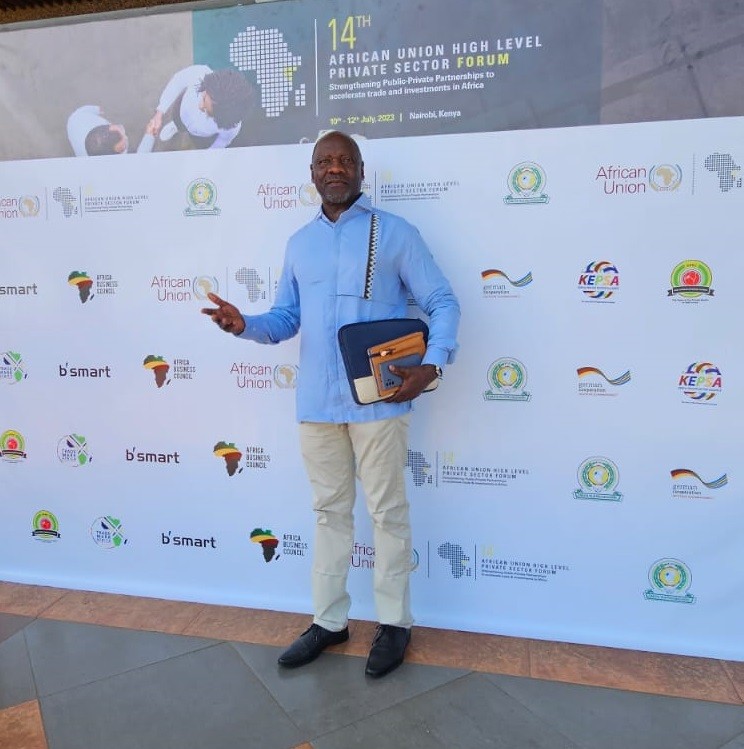The 14th African Union High-Level Private Sector Forum
- 11 Jul, 2023
- 2135 views
Theme: “Public-Private Sector Engagement for Inclusive Growth and Sustainable Development While Deepening Regional and Continental Trade and Investment towards Implementation of AfCFTA”
10th – 12th July 2023, Nairobi, Kenya By Cuthbert Ncube (Executive Chairman-African Tourism Board)

Introduction:
The AfCFTA is a game changer for Africa's economic development. It is a framework for consolidating regional and continental markets, promoting greater trade, and increasing investment. This dialogue will focus on how the AfCFTA can be used to promote regional value chains and increase production capacity, enhance the role of women and youth in regional and continental development, leverage trends in digital transformation to enhance trade and investment, raise awareness of the significance of creative economy in promoting inclusive and sustainable development and deepening regional trade at all levels The dialogue shall also discuss measures in addressing diverse regulatory frameworks that impact regional trade and investments, promote action towards environmental sustainability and address the adverse effects of climate change, and explore strategies to address barriers on access to finance.
1. Leveraging the AfCFTA to promote regional value chains and increase productive capacity:
The AfCFTA is a new opportunity for Africa to enhance its economic growth. To leverage this framework effectively, it is important to focus on promoting regional value chains and increasing production capacity. This can be achieved through investment in critical infrastructure such as transportation, energy, communication, and technology, which will help to lower the cost of doing business, reduce the lead time, and increase efficiency, and profitability. In addition, governments and private sector businesses should collaborate to expand the scope of economic activity, encourage innovation and entrepreneurship, and promote access to capital and resources critical to the development of SMEs.
2. Enhancing the roles of women and youth in regional and continental development:
To achieve the full potential of the AfCFTA, there is a need to ensure that women and youth are fully engaged in various segments of the African economy. This can be done by developing innovative approaches to policy and programmatic interventions, such as skills development, capacity building, and mentorship programs that support the growth and development of women and youth entrepreneurs. Governments, multilateral development partners, and the private sector should collaborate to ensure that gender-sensitive policies are integrated into the design of development programs.
3. Leveraging trends in digital transformation to enhance trade and investment:
Digital transformation represents a new frontier for enterprise development, global value chains, and economic growth in emerging economies. The AfCFTA can support the development of digital infrastructure, digital skills, and create a regulatory environment that can foster innovation and digital entrepreneurship. Achievement of regional integration can be supported by the broad implementation of e-commerce across Africa enabling improved information flow, streamlined trade documentation, and expanded access to markets.
4. Raising awareness of the significance of the creative economy in promoting inclusive and sustainable development and deepening regional trade at all levels:
The creative economy covers a broad range of industries such as music, film, fashion, and crafts. It has a significant contribution to Africa's economic growth, job creation, and overall development. To fully leverage the potential of the creative economy, there is a need to raise awareness of its significance in promoting inclusive and sustainable development and deepening trade at all levels such that policies and strategies that are geared towards promoting the creative economy are designed, enacted, and implemented.
5. Discussing measures in addressing diverse regulatory frameworks that impact regional trade and investment:
Regulation frameworks can be a major bottleneck to economic growth and trade and investment. An integrated and coordinated regulatory framework is needed to support regional trade and investment. Governments and private enterprises should focus on developing policies that align regulations and trade frameworks across the African continent. This will lower administrative costs, create greater transparency, and encourage cross-border investment.
6. Promoting action towards environmental sustainability and addressing the adverse effects of climate change:
The impact of climate change on Africa's economic growth projections could have adverse effects on both social and economic frameworks. Mitigation and adaptation measures need to be included in national development plans to address climate change. Integrating traditional knowledge systems and developing partnerships with international organizations will help to promote climate action and awareness of its significance in maintaining social and economic stability.
7. Exploring strategies to address barriers to access to finance:
Access to finance continues to be a major impediment to economic growth and development in Africa. Addressing barriers to access to finance is necessary for the AfCFTA’s success. Governments and private sector enterprises should focus on developing innovative financing mechanisms, promoting financial inclusion, and developing public-private partnerships that will provide access to capital for SMEs and other entrepreneurs.
Conclusion:
The AfCFTA provides a foundation for enhancing regional trade and continental development. To achieve this, there is a need to develop innovative strategies that focus on promoting regional value chains, expanding SMEs, increasing productive capacity, developing digital infrastructure, empowering women and youth entrepreneurs, and promoting climate action. Governments, international development partners, and the private sector must collaborate, coordinate, and implement collaborative strategies and prioritize activities that will promote economic progress and social stability in Africa. When these measures are taken, the full potential of the AfCFTA will be realized, and its success will serve as a model for regional integration and economic growth in Africa.
- Category:
- Tourism
- No comments




